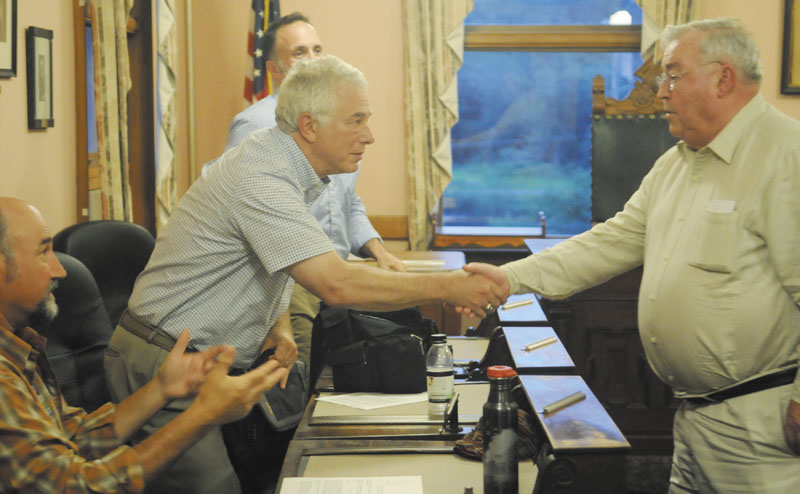HALLOWELL — Cool to a 20-year, 100 percent tax increment finance proposal for the Kennebec Ice Arena’s rebuilding, a city committee delayed a decision on the owner’s preliminary application.
Arena owner Peter Prescott, of Manchester, officially proposed the TIF at a June meeting after filing a draft application with the city. He will appear before the city’s TIF Review Committee again a week from today.
The Kennebec Ice Arena collapsed in March under a heavy load of snow. Prescott said recovering insurance money on the property has been difficult and negotiations are ongoing.
“If everything happened the way it was supposed to, I wouldn’t be here because it would be taken care of,” Prescott said. “We paid for it and didn’t get it — pretty sad.”
He and his attorney, Augusta-based Les Wilkinson, cited a list of business owners who said they have noticed a marked decline in business since the arena’s collapse.
Prescott and Wilkinson said in the arena’s 39 years of operation, owners haven’t taken any money from the business.
“This is before you for the sole reason that this was a previous facility that had a tragic loss,” Wilkinson said. “It is structured on a for-profit model, but effectively has nothing to do with making money.”
Prescott said financial advisers told him to structure the arena as a nonprofit because less risk would be involved and he “wouldn’t benefit” by making money.
“They say there’s no gain for me, but they’re crazy. There is a gain for me,” he said. “It’s hard for people to understand what they’ve had, in a short period of time, is gone.”
City councilors and committee members Phillip Lindley, Steven Vellani and Edmund Cervone cited emails and calls from constituents saying the original proposal was too large.
TIFs are used to allow cities and towns to shelter property taxes generated by new development within designated districts, as long as the sheltered money is used for certain purposes, such as economic development or infrastructure improvements.
If the 100 percent TIF was granted, Prescott would not have to pay taxes on the value between the property’s assessed value, $287,900 and the new property’s value, estimated to be around $4.3 million.
Though the city loses tax revenue, it also sees benefit: Money sheltered during a TIF doesn’t count toward a municipality’s overall property tax value during the TIF’s life. That lower taxable value means state revenue sharing is not affected.
In a memo, City Manager Michael Starn estimated the net impact of the TIF as written in lost tax revenue would be $36,720 annually, more than $725,400 during the life of the TIF.
“It’s undeniable that you have an emotional, compelling story and I think it’s close to undeniable that you provide a community service,” Vellani said. “But 100 percent — I could never vote for that.”
Cervone said while those he talked to were supportive of the ice arena, they thought the TIF was too large.
Lindley said constituents who contacted him were “probably nine to one against” the proposal as written.
“The real sticking point is that 20 years,” Lindley said.
“If we’re nine to one behind, that’s horrible,” Prescott said to Lindley. “I’m positive that if we get through a season … next April rolls around, we’d have no trouble. That’s the sad thing.”
After discussing whether the committee would recommend an up or down recommendation to give to the City Council, it was decided that another meeting would be held next Wednesday to further discuss a public-private partnership.
“We should be willing to see how our creativity solves this problem,” committee member Joel Davis said.
During the meeting, Prescott said he would be the only signatory on a multi-million dollar bank loan.
“Here’s a guy willing to go out and borrow a couple million dollars,” Davis said after the meeting. “My vision is the uniqueness of a public-private partnership.”
After the meeting, Prescott said he will be meeting with accountants to discuss a public-private partnership, something Wilkinson dubbed as laid out by the committee in a “vague” manner.
Prescott also said he would consider relocating the arena if he can’t get a deal in Hallowell.
“It’s not a loss to the city of Hallowell. It’s a gain,” Prescott said during the meeting. “I’ll say that until the day they put me under.”
Michael Shepherd — 621-5662
mshepherd@mainetoday.com
Send questions/comments to the editors.



Comments are no longer available on this story